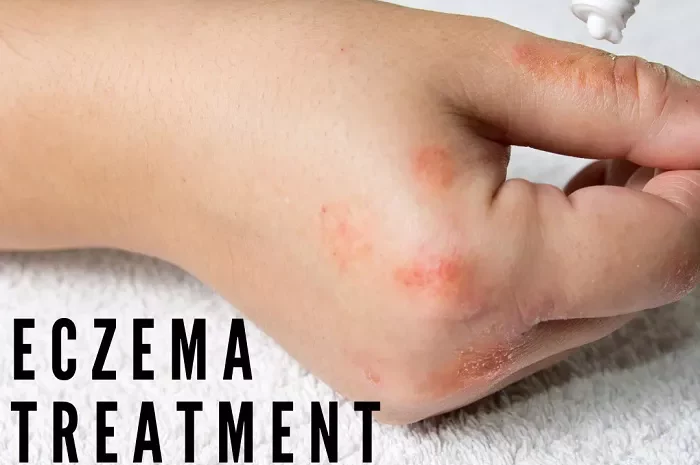Eczema is a common skin condition that causes irritation, redness, itching, and inflammation. It can appear anywhere on the body, but the most common areas are the elbows, knees, hands, and face. Although there is no cure for eczema, there are many ways to calm flare-ups and manage symptoms effectively. If you’re struggling with eczema, this guide will provide you with detailed steps you can take to soothe your skin and reduce discomfort.
Understanding Eczema and Its Triggers
Before we discuss how to calm eczema, it’s important to understand the condition itself. Eczema, also known as atopic dermatitis, occurs when the skin’s protective barrier is weakened, allowing moisture to escape and irritants to enter. This can cause the skin to become inflamed, red, and itchy.
Eczema can be triggered by various factors, including:
Dry skin: Lack of moisture in the skin is one of the most common triggers of eczema flare-ups.
Allergens: Dust, pollen, pet dander, and certain foods can cause allergic reactions that worsen eczema.
Irritants: Harsh chemicals, soaps, and laundry detergents can aggravate eczema.
Weather conditions: Extreme temperatures, both hot and cold, can dry out the skin and lead to flare-ups.
Stress: Emotional stress is known to trigger or worsen eczema.
Infections: Bacterial or viral infections, especially when the skin is already irritated, can lead to a flare-up.
Identifying your triggers is the first step in managing eczema. Keep track of your flare-ups and try to notice any patterns. Once you identify your triggers, you can take steps to avoid them and reduce flare-ups.
Keep Your Skin Moisturized
One of the most important things you can do to calm eczema is to keep your skin well-moisturized. Dry skin is a common trigger for eczema, and it can worsen irritation. Moisturizing helps to lock in moisture, soothe inflammation, and protect the skin’s natural barrier.
Choose the Right Moisturizer
When choosing a moisturizer for eczema, look for products that are fragrance-free and designed for sensitive skin. Thick creams and ointments are often better than lotions because they provide a stronger barrier to lock in moisture.
Some good options include:
Petroleum jelly: This is a great option for sealing in moisture and protecting the skin.
Thick creams: Look for creams that contain ingredients like ceramides, which help restore the skin’s barrier function.
Natural oils: Coconut oil, sunflower oil, and jojoba oil can provide hydration and have anti-inflammatory properties.
How to Moisturize Effectively
To get the most benefit from moisturizing, apply your moisturizer immediately after bathing, while your skin is still damp. This helps lock in the moisture. Reapply throughout the day as needed, especially after washing your hands or taking a shower.
Take Lukewarm Showers, Not Hot
Hot showers can strip the skin of natural oils and lead to dryness and irritation. To calm eczema, it’s best to take lukewarm showers instead. Keep the shower time short and avoid using harsh soaps or body washes. Opt for gentle, fragrance-free cleansers designed for sensitive skin.
After showering, gently pat your skin dry with a soft towel. Don’t rub, as this can irritate the skin further. Immediately apply a moisturizer to help lock in moisture.
Use Eczema-Friendly Soaps and Cleansers
Many regular soaps and body washes contain fragrances, dyes, and harsh chemicals that can irritate eczema-prone skin. It’s important to use soaps and cleansers that are specifically formulated for sensitive skin.
Look for products that are:
Fragrance-free: Fragrances can cause irritation and allergies.
Hypoallergenic: These products are less likely to cause allergic reactions.
Soap-free: Soap can be drying, so a soap-free cleanser may be gentler on your skin.
Some popular eczema-friendly cleansers include:
- CeraVe Hydrating Cleanser
- Eucerin Skin Calming Body Wash
- Aveeno Skin Relief Body Wash
Apply Anti-Inflammatory Creams
Topical corticosteroids are commonly prescribed by doctors to reduce inflammation and relieve itching associated with eczema. These creams work by suppressing the immune response that causes inflammation in the skin.
While corticosteroid creams are effective, they should be used with caution and under the guidance of a healthcare provider. Overuse of steroids can lead to side effects, such as thinning of the skin.
Other anti-inflammatory options include:
Calcineurin inhibitors: These are non-steroidal creams that help reduce inflammation and itching. Examples include tacrolimus (Protopic) and pimecrolimus (Elidel).
Topical corticosteroid alternatives: Some natural remedies, such as aloe vera gel, chamomile, or calendula, may help soothe inflamed skin, though these should be used with caution as they can sometimes cause allergic reactions.
Try Natural Remedies
In addition to conventional treatments, several natural remedies may help calm eczema symptoms. These remedies can be used alongside medical treatments, but it’s always best to check with your doctor before trying new treatments.
Oatmeal Baths
Oatmeal has anti-inflammatory properties that can help soothe itchy, irritated skin. Colloidal oatmeal, which is finely ground oatmeal, is often used in skincare products. To create an oatmeal bath at home:
- Add one cup of colloidal oatmeal to a lukewarm bath.
- Soak in the bath for about 15-20 minutes.
- Gently pat your skin dry after the bath and apply moisturizer immediately.
Coconut Oil
Coconut oil is known for its moisturizing and anti-inflammatory properties. It can help soothe the skin, reduce itching, and lock in moisture. Simply apply organic coconut oil directly to the affected areas, especially after bathing.
Aloe Vera
Aloe vera has cooling and healing properties that can calm irritation and redness. It’s commonly used to soothe sunburns, but it can also be beneficial for eczema. Apply fresh aloe vera gel or a store-bought product that contains at least 95% aloe vera to your skin to reduce inflammation and promote healing.
Honey
Honey is a natural antibacterial and anti-inflammatory substance. It can help reduce infection risk in broken skin and soothe irritated skin. You can apply raw honey directly to eczema patches, leave it on for about 20 minutes, and then rinse it off with lukewarm water.
Avoid Scratching
It’s hard not to scratch when your skin is itchy, but scratching can actually make eczema worse. Scratching damages the skin, leading to further irritation, infections, and increased inflammation. Here are some tips to help avoid scratching:
Wear cotton gloves or socks: This can help protect your skin from scratching, especially while you sleep.
Apply cool compresses: Use a cool, damp cloth to relieve itching instead of scratching.
Distraction techniques: If you feel the urge to scratch, try distracting yourself with another activity, like reading or taking deep breaths.
Manage Stress
Stress is a common trigger for eczema flare-ups. When you’re stressed, your body releases chemicals that can trigger inflammation in your skin. To calm eczema, it’s important to manage stress in your daily life.
Some stress management techniques include:
Meditation: Practicing mindfulness or meditation can help calm the mind and reduce stress levels.
Exercise: Regular physical activity, such as yoga, walking, or swimming, can help reduce stress.
Deep breathing exercises: Taking deep breaths can help calm your nervous system and lower stress.
Wear Soft, Breathable Fabrics
Tight, scratchy, or synthetic fabrics can irritate eczema-prone skin. Opt for soft, breathable fabrics like cotton, which allow your skin to breathe and reduce friction. Avoid wool, polyester, and other synthetic fabrics that can make eczema worse. When choosing clothes, make sure they are loose-fitting and comfortable.
Avoid Eczema Triggers
As mentioned earlier, many factors can trigger eczema flare-ups. The best way to calm eczema is to avoid these triggers whenever possible. This includes:
Allergens: If you have food allergies, avoid foods that trigger your eczema. If pollen or pet dander triggers flare-ups, try to reduce exposure to these allergens.
Irritants: Use fragrance-free and gentle products on your skin. Avoid harsh cleaning products, detergents, or perfumes.
Extreme weather: In the winter, use a humidifier to add moisture to dry indoor air, and in the summer, protect your skin from sunburn with sunscreen designed for sensitive skin.
See a Doctor
If your eczema is not responding to home treatments or is causing severe discomfort, it’s important to consult with a doctor or dermatologist. They can prescribe stronger medications, such as oral corticosteroids or immunosuppressants, to help manage flare-ups.
In some cases, a dermatologist may recommend phototherapy (light therapy), which uses ultraviolet light to treat eczema.
Conclusion
Eczema can be challenging to manage, but with the right approach, it’s possible to calm flare-ups and maintain healthy skin. Keeping your skin moisturized, avoiding triggers, and using the right treatments can make a significant difference. If your eczema persists or worsens, don’t hesitate to consult with a healthcare professional for additional support. With the right care, you can keep eczema under control and enjoy healthier, more comfortable skin.
Related topics:
























